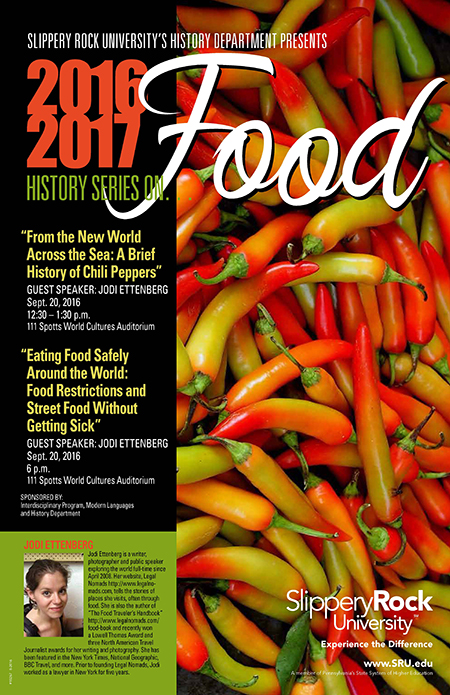SRU history department “dishes up” yearlong food series

Jodi Ettenberg , author of “The Food Traveler’s Handbook” will present a pair of lectures as part of the Slippery Rock University history department’s “2016-2017 History Series on ... Food.”
Aug. 26, 2016

SLIPPERY ROCK, Pa. - Whether it's discussing the day's event around the dinner table; grilling in the parking lot before the big game; or seeking solace in a hearty bowl of soup, food helps tell the American story.
The Slippery Rock University history department will share the story of food through its "2016-2017 History Series on ... Food." The program will include guest lecturers who will discuss food history, policy and challenges through a variety of cooking demonstrations. The series also includes discussions on contemporary topics such as sustainable agriculture.
The goal of the series is to help people understand that every bite of food has a bigger story to tell than what's on the end of a fork. "Where was it (the food) grown? How was it shipped? Those are some of the questions we'll be answering through the series," said William Bergmann, SRU assistant professor of history and series coordinator.

BERGMANN
"One of the many things we want people to think about is the relationship between the food that they eat and its larger global connections," Bergmann said. "We're presenting a broader framework for understanding the connection between people's individual interaction with food and the ways in which our society, our country and our world is organized."
The program, which will offer eight events throughout the academic year, launches Sept. 20 with Jodi Ettenberg, author of "The Food Traveler's Handbook" presenting two lectures.
The first, "From the New World Across the Sea: A Brief History of Chili Peppers," is at 12:30 p.m. The second, "Eating Food Safely Around the World: Food Restrictions and Street Food Without Getting Sick" is set for 6 p.m. Both lectures will be in Room 111 at the Spotts World Culture Building.
"Food is an ideal lens to learn as much as you can about a place and its people," said Ettenberg. "It casts a wide net across anthropology, history, culture and sociology. And of course it's delicious. But in experiencing places through their food there is another benefit, which is the authentic interaction with people on the ground. Food binds cultures in ways we in North America are now just discovering and it makes sense that we'd be finding ourselves more and more interested in how it impacts society."
A second confirmed presenter is Nadine Lehrer, assistant professor of food studies at Chatham University, who will speak on sustainable agriculture. A date for Lehrer's appearance has yet to be determined.
Bergmann said the history department chose food as a series topic because it's accessible to everyone and is a part of life people take for granted.
For example, even an American classic like apple pie may not be as "American" as we think. According to Bergmann, the butter, nutmeg and cinnamon used to create that pie likely came from somewhere else entirely.
"We often times only think about food when it's in front of us," Bergmann said. "When it is presented to us at a restaurant, we don't think about what happened behind the door, how the food was prepared and who grew it. We hope to provide a framework for understanding issues pertaining to food production."
Bergmann used the oceans, rivers and lakes as an example. "Seafood doesn't just appear ... Capital, business, trade and labor all come together to deliver the product that ends up on a plate," he said. "As another layer, we can examine what helped shape the decision to create the food group to begin with."
Conscious decisions about food can be traced all the way back to founding of the "new world" said Bergmann.
"When the earliest Spaniards came to the Americas, they were very reluctant to eat indigenous food, even going so far as to bring their own livestock and crops. (Americans) have a tendency to do the same thing today when we go overseas and eat at McDonalds."
MEDIA CONTACT: Gordon Ovenshine | 724.738.4854 | gordon.ovenshine@sru.edu

